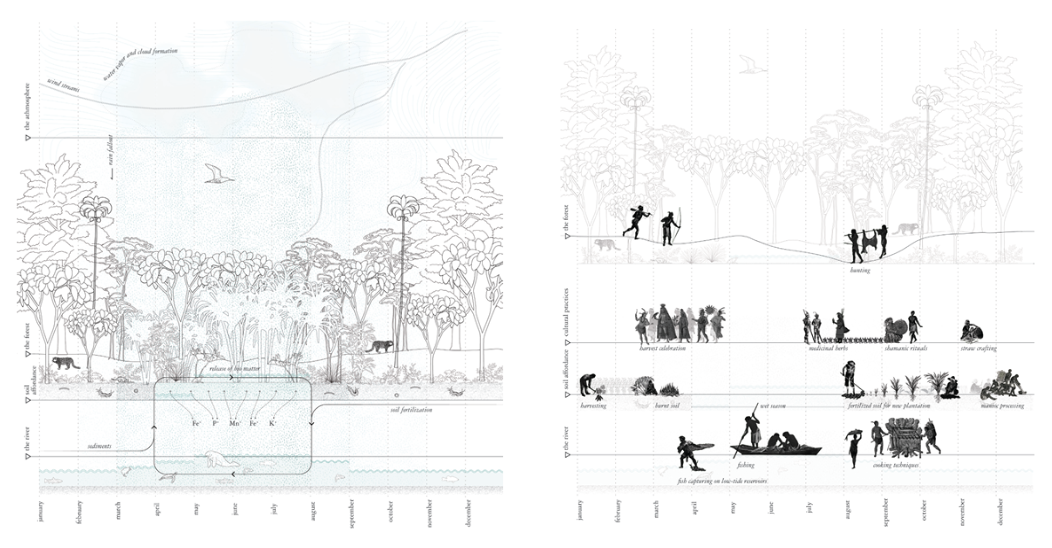Critical Environments:
Material Ecologies of Care
The urbanism graduation cluster Critical Environments: Material Ecologies of Care focuses on the metabolic, extractive, and ecological geographies underpinning urbanisation and their transformation into socially and ecologically just and sustainable environments. Rather than focusing on making material ecologies efficient and performative, the cluster aims to develop projects that foreground practices of care, repair, and stewardship across human and more-than-human worlds. The cluster is rooted in the Critical Environments research group, which rethinks urbanism amid today’s overlapping planetary crises – and builds on the legacy of the Transitional Territories graduation studio.
J. Ferreira de Sousa Daher Moura (2024), Territorial In-Betweens
Rooted in spatial justice and environmental ethics, the cluster: investigates socio-environmental inequality and systemic risk through posthuman and trans-scalar approaches; emphasizes the entanglement of ecological and social processes, seeking ways to foster collaborative synergies across species, systems, and communities; considers the material world not as a mere backdrop for analysis or a passive object of design, but as an active web of agents that must be included in both the production of knowledge and the imagining of alternative futures; highlights practices of care and repair as generative and foundational to rethinking urban futures.
Students are encouraged to challenge human- and city-centric narratives and critically engage with transdisciplinary research methods, drawing from urban theory, political ecology, science and technology studies (STS), and environmental humanities.
Students are welcome to bring their own case and fascination. The cluster also offers the opportunity to be directly involved in some ongoing research projects being developed under the Critical Environments umbrella and others, among others: Archipelago Project (UNDP, the City of Porto Alegre Secretary of Environment, Urbanism, and Sustainability, and TU Delft); Convivium: Economies and Spaces of Food Production (TU Munich, TU Delft).
Students co-develop knowledge and testing ideas in real-world contexts with academic, professional, and societal partners, as well as local communities and ecosystems.
Mentors
Taneha Bacchin, Urban Design
Nikos Katsikis, Urban Design
Víctor Muñoz Sanz, Urban Design
Francesca Rizzeto, Urban Design
Luca Iuorio, Environmental Technology and Design
Daniela Maiullari, Environmental Technology and Design
Alex Wandl, Environmental Technology and Design
Thomas Verbeek, Urban Studies
Daniele Cannatella, Urban Data Science
Denise Piccinini, Landscape Architecture
Angela Rout, Data Design Society
Programme
Students participate in reviews and lectures with guests, and other activities, jointly with the cluster Critical Environments: Rights of Nature and New Forms of Governance.
Types of Master Thesis
Projects move beyond solutionism and emphasize the agency of design both as a tool for developing interventions, and as a mode of critical inquiry.
Projects reimagine the material basis of urbanization, addressing environments affected by climate emergencies, humanitarian crises, biodiversity loss, pollution, and systemic inequality, social and ecological.
Projects emphasize a grounded, imaginative, and reflexive design inquiry, explore new forms of cohabitation, ecological justice, and spatial agency.
Projects span across scales and territories from the molecular to the territorial, and across human and more-than-human, city and more-than-city landscapes, emphasizing their interconnectivity.
Exemplary Graduation Projects
Bram Terwogt (2025), Rooting for Regeneration: Towards a Sustainable Food System (Best thesis on Design for Human Autonomy, Delft Design for Values Institute)
Kirthan Shekar (2024), Designing Devolution: Extraction Infrastructure Transformations for a Post-Capital Norrbotten
Tara Kanj (2023), Beneath the pavement, the beach: A semantic exploration of time, space, and their volume of permutations through Lebanon's littoral
Luiz do Nascimento (2022) Regeneration of Ecological Integrity in the Tietê River Basin.
Marijne Kreulen (2021) Offshore Urbanism: Using design to understand, represent and employ human-sea relations in the spatial reorganisation of the Barents Sea
